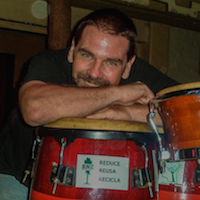In its simplest form, writing is the act of arranging words and ideas in such a way that has never done before.
The words we use are not new and, many times, neither are the ideas. As writers, we are constantly borrowing (sounds nicer than stealing) from other artists, from life, our friends, family, neighbors, strangers on the street, clouds in the sky.
But the process of writing, when performed sincerely, is brutally intimate. When we write, we bear all; let our passions, our fears, our dementia drip onto the page one word at a time. Writing, especially from personal experience, is like walking into a crowd of strangers, naked and unannounced. We split ourselves down the middle and reveal the innermost workings of heart, mind and soul.
What some folks who read elephant journal may already know is that many readers respond to articles—often with the same fervor with which the article was originally written. Last week, I wrote an article about Global Divestment Day, encouraging people to pull their investments from the fossil fuel industry, in order to weaken the industry’s political and economic influence.
The excessive consumption of fossil fuels is accelerating climate change and putting our future at risk.
I’m not a scientist, but I am passionate about thwarting climate change, so it was an easy write after I did my homework. Divestment is also a controversial topic because of our masochistic addiction to fossil fuels. So, I was ready for anything.
A couple of hours after the article was posted, an email showed up in my inbox, titled “Reply to your Divest article on Elephant Journal.” It was from a woman in Canada—“Tracy”, let’s call her (because she has asked to remain anonymous)—and it was extensive. She tore me to shreds. She started by pointing out the inconsistencies and what she considered to be scientific fallacies in my article. And she ended with a jab to the ego by telling me, “Oh, and as lovely as the alliteration of divest (from) destruction was—a bit sensationalized, but then so much of the media in all its forms is guilty of that.”
Slammed.
I really don’t think that she meant for her email to be an attack, but it felt like she had dragged me by the scruff of my neck up to the 54th floor of the Exxon building and dropped me off like a sack of spent biomass. My initial response was fight or flight. I debated whether to strike back or delete the email and pretend it never happened.
Fortunately, I have been criticized enough times to know that it’s better to breathe. I read through her email a couple more times and then calmly crafted a response. I realized at that moment that, in some small way, I was doing my job.
When someone takes the time to read what you have written and actually respond, that means something has been triggered.
It doesn’t much matter to me if people agree with what I have to say. The thing is, as writers, we want people to feel something when they digest our words: hope, anger, elation, sadness—something, anything.
In this case, my article had also made it “beyond the choir,” as elephant journal founder, Waylon Lewis, is fond of saying. This was no ordinary criticism; this was opportunity.
Over the next couple of days, Tracy and I exchanged several emails. It was obvious to me that she was passionate about her position of opposing divestment from fossil fuels. She sent me information on research and development of renewable energy sources, academic articles that discredited divestment and her own personal story, which was worth more than any of the technical reports. I did the same in return and, piece by piece, we started to build a bridge of understanding.
At one point, I also sent her an article that I had just written about the environmental impact of meat production—as if to say, “It’s not just fossil fuels, cows are responsible too.” And her response brought light to a dreary day: she said that she had been a vegetarian for eighteen years and my article had summed up perfectly her own justification for eliminating meat from her diet.
We had stumbled onto common ground.
Tracy and I will probably not reach an agreement on the issue of fossil fuels, but through this exploratory process, we have agreed to disagree.
Without question, we are both better informed as a result of our exchange of ideas. We could have maintained closed-minded opinions on either end of the spectrum—one black, one white—but instead we have chosen to recognize that the world is really made up of an infinite grayscale.
Behind every opinion, there is a person with a story and a passion for living. Our views come from the accumulation of our experiences in this life and they are all valid.
Too often, we let our opinions get in the way of building understanding with people who don’t think like us, look like us, act like us.
With the way the world is today, the way we are fractioned into tiny groups defending our particular versions of the truth, there is no greater task than seeking common ground. Elephant journal provides an ideal platform for presenting ideas, discussing them and striving for understanding.
Today is a great day to reach beyond the choir. We can make conscious choices to talk to people with different truths and listen to their stories. We can find common ground with any human being, if we are willing to invest the time and energy to explore.
Understanding breeds peace.
Relephant read:
Divesting From Destruction: How to Fall Out of Love With the Fossil Fuel Industry
Compassionate Vegetarianism: Meat is More Than Just Dead Animals
Author: Peter Schaller
Assistant Editor: Hilda Carroll/ Editor: Ashleigh Hitchcock
Photo: Lacy Gillott via Pixoto







Read 4 comments and reply